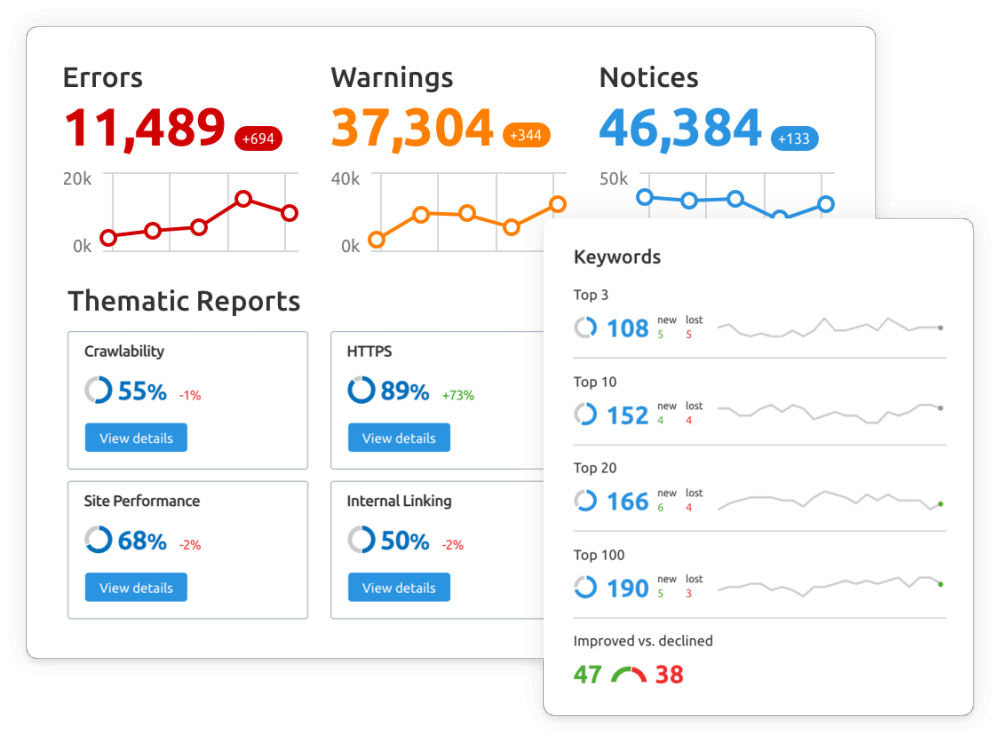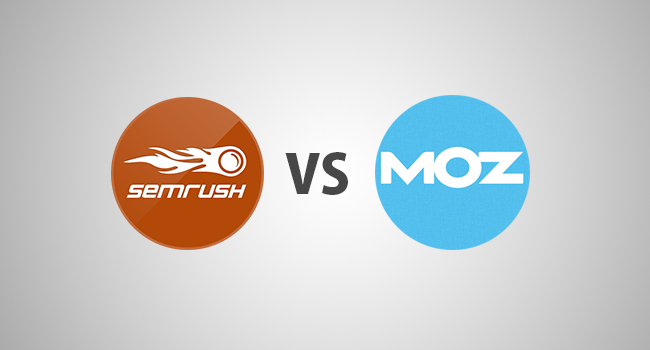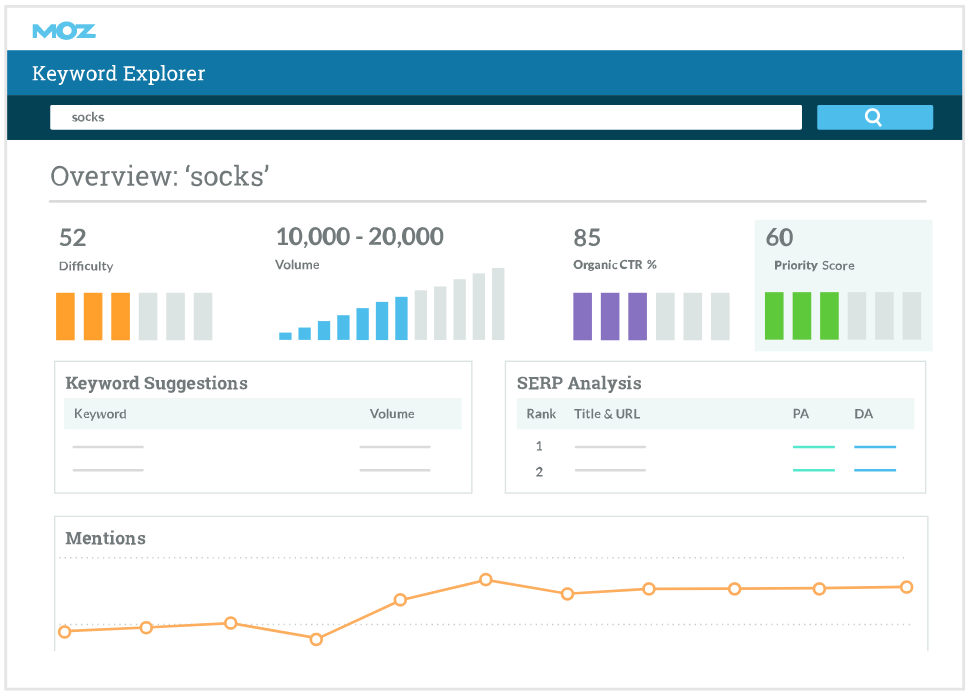
Search engine optimization (SEO) continues to be significant for businesses who want to stay ahead of their competition. However, SEO changes constantly. For example, in 2018, reports showed that more than half of worldwide online traffic now comes from mobile devices. As a result, Google began mobile-first indexing starting March 2018. Today, more people are using smart devices or smart assistants on devices. Marketing experts believe that businesses should now consider optimizing for devices also. As digital marketing faces new challenges, it is important to be better equipped with the right SEO tool such as SEMrush and Ahrefs. But which one is better?
SEMrush – All-in-one Marketing Toolkit
SEMrush is a comprehensive marketing software suite that helps users promote and manage their online visibility. It enables them to plan effective marketing strategies. With its massive collection of data, they can research, analyze, and understand better their market and even their competitors. SEMrush includes tools for analyzing and improving organic search, social media, mobile data, and link building activities. With headquarters in Boston, USA, and offices in Russia, Czech Republic, and Cyprus, it claims of more than 4 million users, and database of over 540 million domains and 10+ billion keywords.

Ahrefs – Search Traffic Tool Suite
Ahrefs is an online suite of SEO tools and resources. It helps users improve their website rankings. They are able to analyze data on link building and content marketing through its reports. Ahrefs’s proprietary crawl technology allows its robots to go over billions of web pages constantly, providing fresh updates every 15 minutes. Among its tools are the Site Explorer, Keyword Explorer, Content Explorer, and Rank Tracker, among others. Founded in 2010, it is based in Singapore. It claims to have the largest index of backlinks, with 16 trillion known links, crawling 5 billion web pages every day, and data on 170 million root domains.

Common Features
SEMrush and Ahrefs have common features and capabilities. Both have keyword research tools that allow users to choose the right keywords to improve their online presence. They both have content gap analysis research method, too. Both tool suites have backlink analysis tools that help users find link building opportunities, identify bad links, see which pages has the highest authority, and more. Both SEMrush and Ahrefs also have content explorer/topic research tool, site audit, position/rank tracking, and browser extensions.
Differences
SEMrush provides a slightly wider scope on digital marketing workflow by including solutions for ongoing monitoring, competitive intelligence, social channel posting, and content creation. In terms of statistics, it has more with 14.1 billion keywords over Ahrefs’s 8.2B, 548 million domains over 170M, and 6.1 billion crawled pages per day, over the other’s 5B per day. SEMrush has more flexible exporting and reporting tool, allowing users to export from its different tools to CSV and XLS formats, allowing them to create custom PDF reports, and one tool to export to ZIP file format. The site audit results are more navigable, and the dashboard shows errors and warnings immediately.
Ahrefs is the tool of choice when it comes to backlinks. It provides more complete and accurate backlink analysis reports. The new Content Explorer 2.0 includes improvements that can be used for trends data and data-driven content research. Ahrefs’s broken link building capability is unique and really useful. Its browser extension shows more useful statistics, such as the number of backlinks, referring domains, search traffic estimates, estimated number of keywords it ranks for, and more. Lastly, the user interface of all its tools are intuitive and easy to use. They present information that are easy to understand.
Pricing
SEMrush offers several paid plans, starting with $99.95 per month for 1 user. There is an option to pay either month-by-month, or annually, which results in discounts. All plans include 28 tools, API access in the Business plan, and a custom Enterprise plan.

Ahrefs also offers several paid plans, with a trial plan of $7 for 7 days. Paying annually results in getting 2 months free. The plans start with the Lite plan at $99 per month for 1 user, but is very limited in terms of features.

Best for:
SEMrush is best for SMBs and large companies with a sizable marketing department who want more details and numbers when they look at their dashboards and reports. It has more comprehensive search engine marketing capabilities and better suited for PPC advertising, competitive analysis, and cost-per-click mapping. It also has better social media features, with full-feature social media scheduling tool. Users can get social media site reporting, analytics, and competitor insights as well. SEMrush is also ideal for content marketing because of its features for brand monitoring, post tracking, and content audit tool. Therefore, it is best suited for companies seeking an all-in-one solution.
Ahrefs is an ideal tool suite for freelancers, startups, SMBs and large firms with a focus on SEO and backlink analysis. It can provide traffic information for search results, which is useful for determining which keywords to go after. It gives extremely accurate link analysis, due to having the largest backlinks database. Users who need a tool to see how fast or steady a website is growing will find it very useful. Ahrefs also provide users the ranking history of all pages, all presented in an easy-to-understand format with a intuitive interface. It is best suited for agencies and professionals who need to focus on SEO.
Conclusion
SEO makes it easy for customers and prospects to find a company, its product or service, when they want information. It can help put a website or content in Google’s top ranking pages for a long period of time. And more people would click organic rankings over pay-per-click (PPC) ads, even though ads appear on top of them. Also, SEO can promote the reputation of a brand and help public relations through properly researched link building. Choosing the right tool, however, needs also to go together with a company’s needs, objectives, methods, and style of work, among others.



